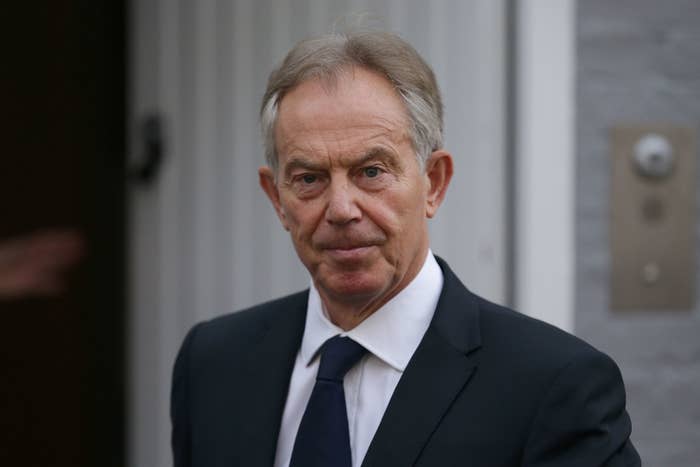
Tony Blair took the UK to war in Iraq before all peaceful options had been exhausted, having relied on "flawed" and unjustified assessments of the threat posed by Saddam Hussein’s weapons of mass destruction, and with almost no plan for how to run the country after the old regime was removed from power.
The damning conclusions were delivered by Sir John Chilcot on Wednesday as he published his official Iraq Inquiry report, which has been seven years in the making. The report is heavily critical of Blair, for his actions both in the run-up to the invasion and afterwards, as well as other senior ministers, the intelligence agencies, and Whitehall.
“We have concluded that the UK chose to join the invasion of Iraq before the peaceful options for disarmament had been exhausted. Military action at that time was not a last resort,” Chilcot said in an excoriating statement read out in central London.
"The judgements about the severity of the threat posed by Iraq’s weapons of mass destruction – WMD – were presented with a certainty that was not justified. Despite explicit warnings, the consequences of the invasion were underestimated. The planning and preparations for Iraq after Saddam Hussein were wholly inadequate.”
The report also revealed a memo from Blair to then US president George W. Bush, written in July 2002, eight months before parliament approved the invasion of Iraq, in which he told him: "I will be with you, whatever," even though he conceded the military part of the exercise would be "hazardous" and could have "unintended consequences".
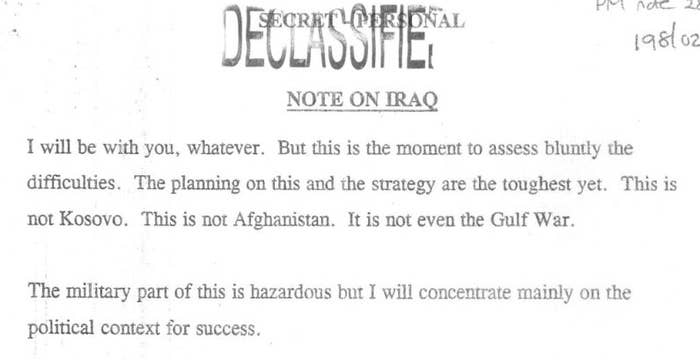
Chilcot said that ultimately, the 2003 invasion that toppled Saddam Hussein and the subsequent attempts to rebuild Iraq had not succeeded: “The government failed to achieve its stated objectives.”
The harshest rulings were delivered on the longer-term consequences of the invasion, Blair’s lack of direction for postwar planning, and the UK government’s scant options for the aftermath of the invasion.
In his evidence to the inquiry, Blair insisted the difficulties encountered in Iraq post-invasion could not have been known about in advance.
But in one of the most damning verdicts in his statement, Chilcot dismissed this defence. "We do not agree that hindsight is required," Chilcot said, adding that "the risks of internal strife in Iraq, active Iranian pursuit of its interests, regional instability and Al Qaida activity in Iraq were each explicitly identified before the invasion".
The report found the UK was concerned with reducing the level of forces deployed in Iraq rather than rebuilding the country, resulting in the British military’s campaign there ending “a very long way from success”.
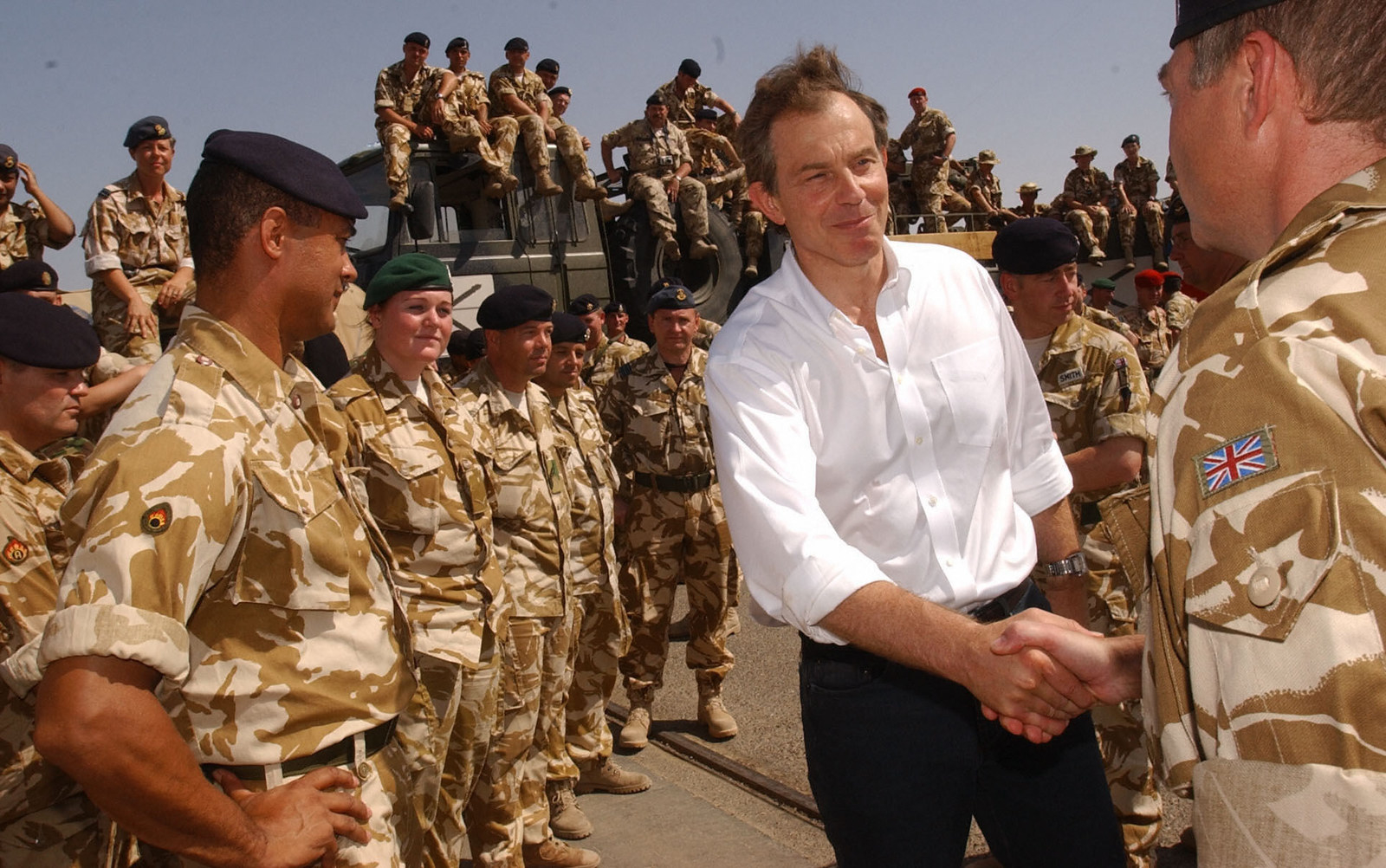
On the contentious use of flawed intelligence to justify the invasion of Iraq, Chilcot concluded that the UK’s intelligence agencies had an “ingrained” belief that Iraq held weapons of mass destruction. He reported that judgments about Iraq's military capabilities were “presented with a certainty that was not justified”.
The report criticised intelligence agencies for repeatedly telling Blair that Saddam Hussein had chemical and biological weapons while not warning the former prime minister that their assessments of Iraq’s military capabilities had not been established beyond doubt.
“It is now clear that policy on Iraq was made on the basis of flawed intelligence and assessments," the report said. "They were not challenged, and they should have been.”
Crucially, he concluded Blair had been warned that invading Iraq risked heightening the domestic terror threat in the UK from al-Qaeda. Blair had also been warned that an invasion might lead to Iraq's weapons and capabilities falling to terrorists.
In conclusion, Chilcot said Blair “overestimated his ability to influence US decisions on Iraq”.
“Military action in Iraq might have been necessary at some point," he said. "But in March 2003 there was no imminent threat from Saddam Hussein, the strategy of containment could have been adapted and continued for some time, the majority of the security council supported continuing UN inspections and monitoring.
“Above all, the lesson is that all aspects of any intervention need to be calculated, debated and challenged with the utmost rigour.”
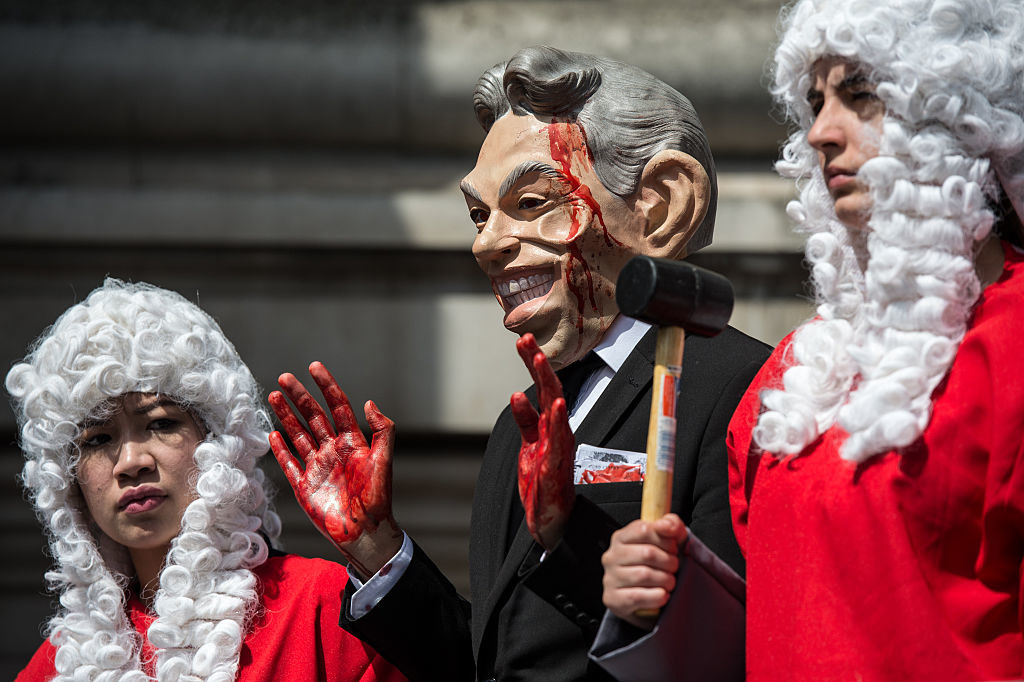
Following publication of the report, Blair held a press conference where he accepted "full responsibility, without exception and without excuse" for the UK's involvement in Iraq, and said he "sincerely felt the grief and suffering" of those who lost loved ones during the conflict.
"The intelligence assessments made at the time of going to war turned out to be wrong," said Blair. "The aftermath turned out to be more hostile, protracted and bloody than ever we imagined. The coalition planned for one set of ground fights and encountered another, and a nation whose people we wanted to set free and secure from the evils of Saddam became instead victim to sectarian terrorism.
"For all of this, I express more sorrow, regret, and apology than you may ever know or can believe."
However, the former prime minister added that it was "the right thing to do" to remove Saddam Hussein from power as Hussein was "a threat to peace and to his own people", and said he will never accept that "those who died or were injured made their sacrifice in vain".
"As the report makes clear there were no lies, parliament and cabinet were not misled, there was no secret commitment to war, intelligence was not falsified, and the decision was made in good faith," continued Blair. "However, I accept the report makes serious criticisms of the way decisions were taken, again I accept full responsibility for these criticisms."
A spokesperson for Bush said: "President Bush is hosting wounded warriors at his ranch today and has not had the chance to read the Chilcot report. Despite the intelligence failures and other mistakes he has acknowledged previously, President Bush continues to believe the whole world is better off without Saddam Hussein in power.
"He is deeply grateful for the service and sacrifice of American and coalition forces in the war on terror. And there was no stronger ally than the United Kingdom under the leadership of prime minister Tony Blair. President Bush believes we must now find the unity and resolve to stay on the offensive and defeat radical extremism wherever it exists."
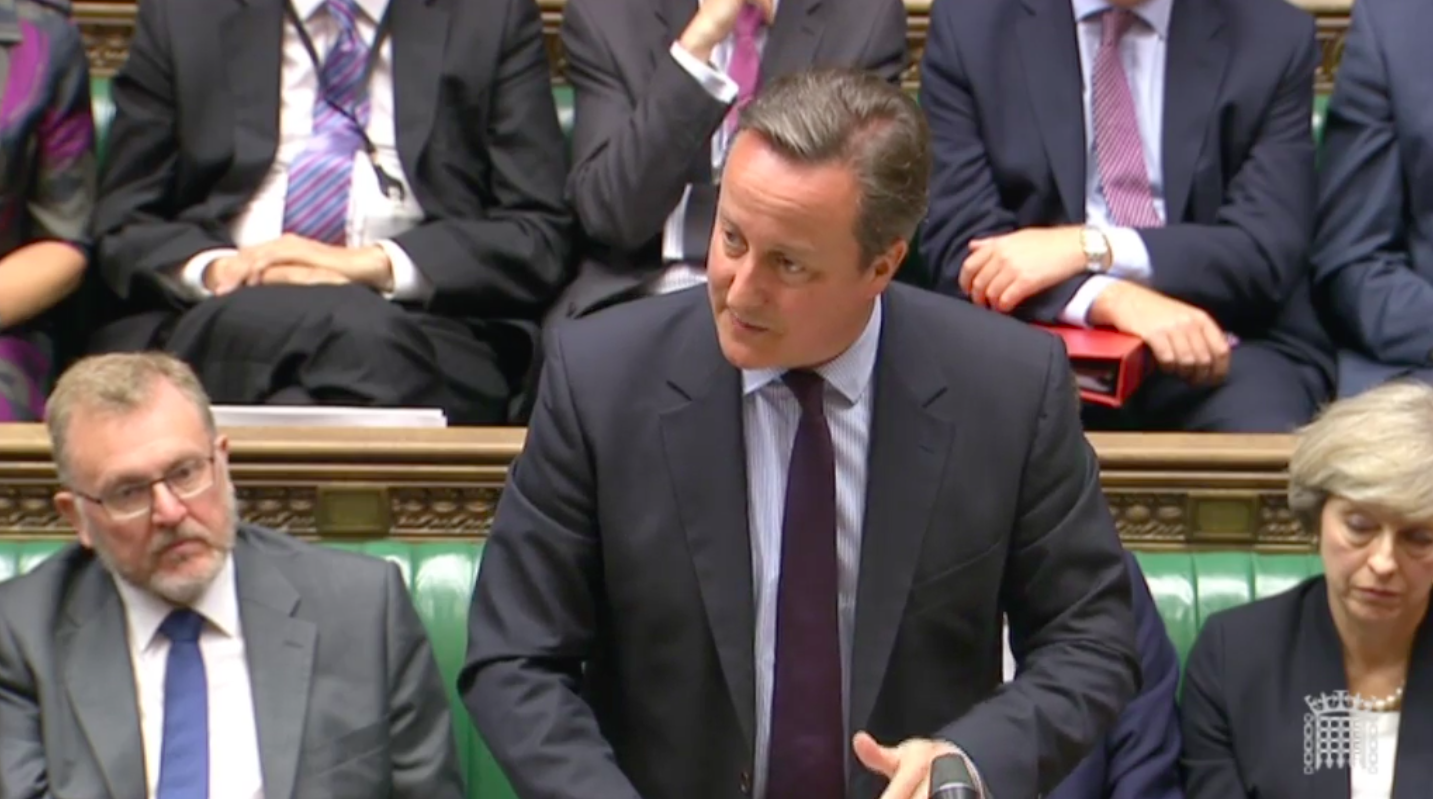
Responding to the report in the House of Commons, David Cameron said it was "inconceivable" that military action would be taken by the UK today without "proper planning" for the aftermath.
"The decision to go to war came to a vote in this house," said the prime minister. "Members on all sides who voted for military action will have to take our fair share of the responsibility. We cannot turn the clock back, but we can ensure that lessons are learned and acted on."
Labour leader Jeremy Corbyn, who was a vocal opponent of the Iraq war in 2003, called the military intervention "an act of military aggression launched on a false pretext". He stopped short of calling for legal action to be taken against Blair but said those responsible for the war "must face up to the consequences of their actions".
Corbyn also apologised on behalf of the Labour party for for the "disastrous" war, saying: "[This] apology is owed first of all to the people of Iraq. Hundreds of thousands of lives have been lost and the country is still living with the devastating consequences of the war and the forces it unleashed.
"They have paid the greatest price for the most serious foreign policy calamity of the last 60 years. The apology is also owed to the families of those soldiers who died in Iraq or who have returned home injured or incapacitated. They did their duty but it was in a conflict they should never have been sent to.
"Finally, it is an apology to the millions of British citizens who feel our democracy was traduced and undermined by the way in which the decision to go to war was taken on the basic of secret ‘I will be with you, whatever’ understandings given to the US president that have now been publicly exposed."
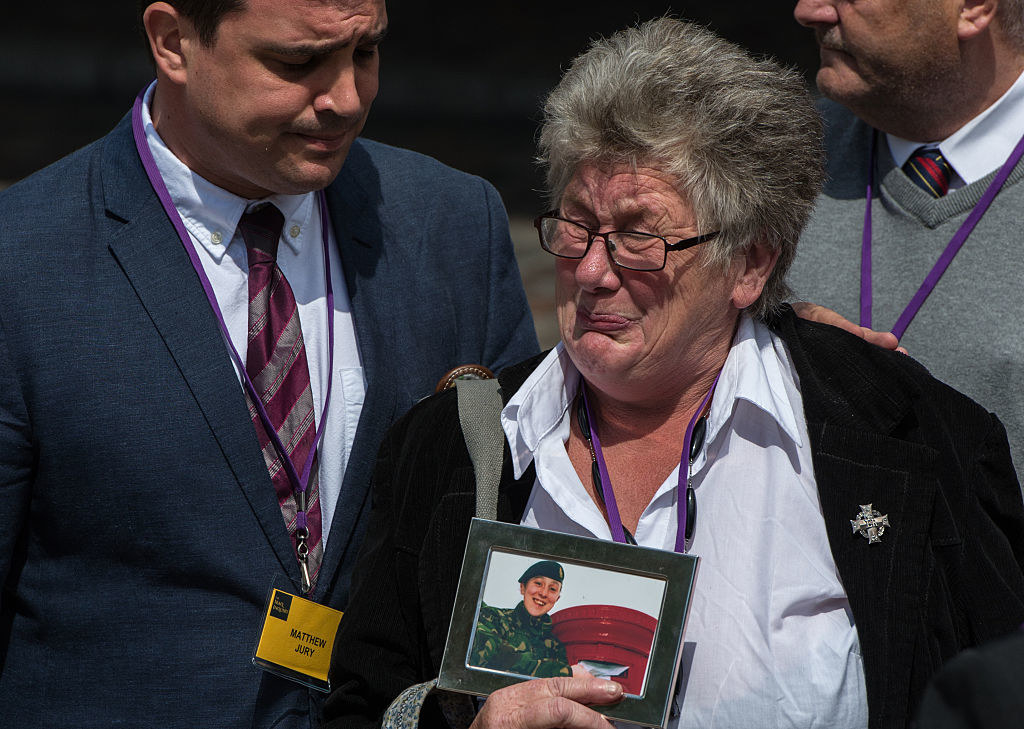
Family members of British military personnel who died in the conflict held a press conference immediately after Chilcot announced his findings where they delivered damning criticism of Blair and the UK government. Sarah O’Connor, who lost her brother Sergeant Bob O’Connor, broke down as she spoke of the “anger” she felt.
“I’ve gone back to that time when I learned that my brother had been killed,” she said. "There’s one terrorist in this world that the world needs to be aware of – and his name’s Tony Blair."
Reg Keys, whose son Lance Corporal Thomas Keys was killed, said: “I can only conclude that unfortunately and sadly, my son died in vain."

